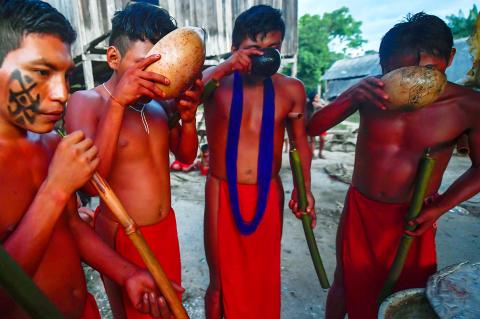Deep in the Amazon rainforest, it’s that time again — beer o’clock.
Members of the tiny, remote Waiapi tribe in Brazil’s eastern Amazon raise calabash gourds to their painted faces and quaff the homemade brew they call caxiri.
Draining the salad-bowl-sized gourd, usually in one go, they send for a refill, which is scooped from an enormous hollowed-out log resembling a canoe, only brimming with beer.

Photo: AFP, Apu Gomes
The tribesmen of Manilha village, dressed in red loincloths, black-and-red body art and sashes made of bright beads, soon get merrily drunk.
The party, which kicks off after lunch and continues late into the star-filled night, was called in honor of the Waiapi river spirit, a giant anaconda-like serpent called Sucuri who demands constant appeasement.
But the Waiapi need little excuse to organize drinking sessions, preferably with a sing-song.

Photo: AFP, Apu Gomes
“When you drink, your vision changes. You lose shame. Happiness comes and your feet start moving,” says Japarupi Waiapi, a 45-year-old chief visiting from a neighboring community.
As the caxiri flows, the music picks up.
Half a dozen men play bamboo flutes, others sing and everyone takes turns to blow on a giant flute made from an embauba, or trumpet tree, about three meters long.
“We play the flutes so that Sucuri is happy and doesn’t snatch people when they swim,” Japarupi Waiapi says. “The river is very important. We use it to fish, to wash, to play in.”
Wiping his mouth after a deep drink of caxiri, the Waiapi chief thinks of another, entirely logical reason why the river spirit deserves honoring.
“If there were no river, there’d be no party.”
THE DAILY GRIND
The Waiapi are self-sufficient, able to do without electricity, phones, cars, most clothes or even money. But while everything they need for survival can be found in the forest, daily life as hunters and subsistence farmers can be grueling.
Caxiri is their one luxury.
Sometimes the tribesmen start in the morning for a casual sitdown and a couple of pints. Sometimes it’s an elaborate affair, a full-blown party, with other villages invited and going on all night.
“These caxiri bouts were mentioned by numerous travelers in French Guiana in the 1800s. There is no doubt that getting drunk was an important Wayapi tradition,” wrote anthropologist Alan Tormaid Campbell, who lived with the Waiapi in the 1970s, learned their language and wrote a 2002 book Getting to know Waiwai.
Behind the scenes, though, it takes back-breaking work to make the tradition happen. And women, who drink caxiri in lesser quantities, are responsible.
Caxiri is brewed from cassava or yams, with beige or purple versions, coming in varying degrees of potency.
The cassava, also used to make tapioca, is harvested from a small plantation in a patch of cleared forest outside Manilha, where, lacking tree cover, the sun pounds ferociously.
Women get there by crossing a river, then hiking with tall backpacks woven from palm leaves, which they fill with tubers, before returning under the staggering weight.
Then in the village, the laborious process of grating, boiling, straining, wringing, baking, fermenting and otherwise transforming the cassava begins. The resulting beverage looks closer to soup than beer.
Eriana Waiampi, 48, who like the other women on the expedition was topless and carried a machete, shrugged off the idea that this might not be worth the trouble.
“We are women. We are warriors to carry cassava,” she said.
HANGOVER CURE
Within hours, the revelers at Manilha’s party had drunk their way through the entire canoe of beer. Fortunately, a second canoe load awaited at the other end of the village.
The increasingly enthusiastic musicians, huddling together and holding on to each other, played the same two notes over and over in a tireless, hypnotic rhythm.
Dancing in a bobbing motion, they shuffled through the village like mad pipers.
First they visited Manilha’s elderly chief who reclined in his hammock, singing along. Next, they visited the women, who drank in a rather less frenzied way.
At sundown, darkness swallowed the entire village, leaving only scattered points of firelight. But the party went on.
The musicians kept dancing and blowing, while men and women laughed and told stories around a central fire. One rather tipsy tribesman, covered in traditional Waiapi ink designs, reenacted a hunting scene, extending his arms to demonstrate the size of some recent prize.
Aka’upotye Waiapi, 43 and eldest son of the chief, looked content.
“Caxiri isn’t just a way to get drunk,” he said. “It’s a way to bind Waiapi to their ancient ways and to keep the young from straying to the temptations of Brazilian towns.”
“If we don’t keep our culture through caxiri, the young will go there to drink non-Indian drinks,” he said. “Lose caxiri and we lose our culture.”
As the stars thickened over the rainforest and the night frogs chorused, guests began to drift off to their hammocks.
A few risked waking up to headaches, but no worry, Japarupi Waiapi said. The tribe has its own cure, a concoction of cassava, a cassava extract called tucupi and pepper.
“Drink that,” he said, “and no hangover.”

Dec. 9 to Dec. 15 When architect Lee Chung-yao (李重耀) heard that the Xinbeitou Train Station was to be demolished in 1988 for the MRT’s Tamsui line, he immediately reached out to the owner of Taiwan Folk Village (台灣民俗村). Lee had been advising Shih Chin-shan (施金山) on his pet project, a 52-hectare theme park in Changhua County that aimed to showcase traditional Taiwanese architecture, crafts and culture. Shih had wanted to build all the structures from scratch, but Lee convinced him to acquire historic properties and move them to the park grounds. Although the Cultural

The Taipei Times reported last week that housing transactions fell 15.3 percent last month, to under 20,000 units. However, the market boomed for the first eight months of the year, and observers expect it to show growth for the year as a whole. The fall was due to Central Bank intervention. “The negative impact of credit controls grew evident for the third straight month,” said Sinyi Realty Inc (信義房屋) research manager Tseng Ching-ter (曾敬德), according to the report. Central Bank Governor Yang Chin-long (楊金龍) in October said that the Central Bank implemented selective credit controls in September to cool the housing

Bitcoin topped US$100,000 for the first time this week as a massive rally in the world’s most popular cryptocurrency, largely accelerated by the election of Donald Trump, rolls on. The cryptocurrency officially rose six figures Wednesday night, just hours after the president-elect said he intends to nominate cryptocurrency advocate Paul Atkins to be the next chair of the Securities and Exchange Commission. Bitcoin has soared since Trump won the US presidential election on Nov. 5. The asset climbed from US$69,374 on Election Day, hitting as high as US$103,713 Wednesday, according to CoinDesk. And the latest all-time high arrives just two years after

About half of working women reported feeling stressed “a lot of the day,” compared to about 4 in 10 men, according to a Gallup report published this week. The report suggests that competing demands of work and home comprise part of the problem: working women who are parents or guardians are more likely than men who are parents to say they have declined or delayed a promotion at work because of personal or family obligations, and mothers are more likely than fathers to “strongly agree” that they are the default responders for unexpected child care issues. And 17 percent of women overall